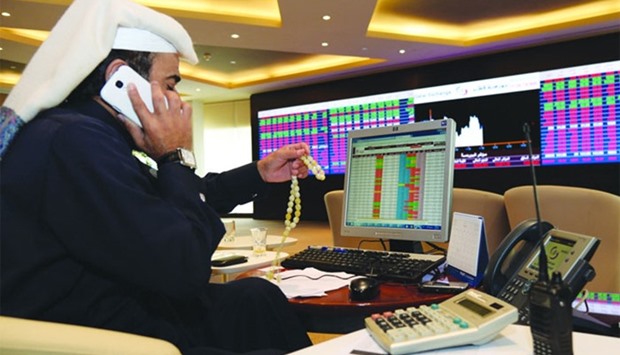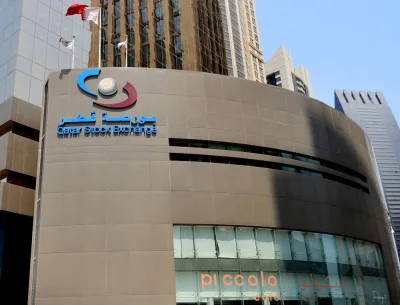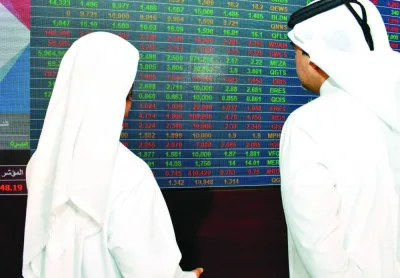Foreign institutions were seen bullish as the Qatar Stock Exchange settled little over 8,900 this week, which saw the siege countries decide against imposing further economic sanctions on Doha.
Transport counter witnessed strong demand amidst 1.19% decline on the QSE this week which saw Moody’s, a global credit rating agency, view that the political and economic blockade by the siege countries have not "materially" changed Qatar's macro fundamentals as well as institutional and finance strengths.
Domestic institutions continued to be bullish but with lesser vigour this week which witnessed Qatar Petroleum (QP) announce plans to enhance Qatar’s liquefied natural gas (LNG) production by 30% to 100mn tonnes per annum.
On a year-to-date basis, just like the QSE, Dubai, Abu Dhabi and Saudi Arabian bourses were in losses.
Local retail investors turned net sellers and there were increased bearish sentiments among non-Qatari individuals this week which saw BMI, a Fitch company, view that Qatar's decision to enhance LNG output makes "strong" commercial sense and it could lift Doha's market share in global LNG market, thus putting it in an advantageous position to negotiate with buyers.
Islamic stocks were declining faster than the main index this week which witnessed Moody’s find the current diplomatic stir to have only “limited” impact on QP, whose exports are majorly to the Asian economies.
Overall trade turnover and volumes were on the decline this week, which saw banking, real estate, telecom and industrials sectors account for about 86% of the volumes.
The banks and financial services sector accounted for 32% of the total volume, realty (19%), telecom (18%), industrials (16%), transport (9%), consumer goods (3%) and insurance (2%) this week which saw QSE disclose increasing investment prospects from the UK and Hong Kong for exchange trade fund and commodities fund respectively.
The banks and financial services’ share in total trade turnover was 41%, industrials (20%), real estate (12%), telecom and transport (8% each), consumer goods (7%) and insurance (4%) this week, which saw Moody's affirm 'A2' long-term issuer rating of Ooredoo as well as 'A2' senior unsecured ratings on Ooredoo International Finance, a wholly owned finance vehicle, and Ooredoo Tamweel, all with "stable" outlook.
Opening weak at 8,822 points, the market rebounded next day but only to witness selling on Tuesday, which then gave way to buying interests the subsequent day.
However, it largely remained flat on last day of this week which saw Vodafone Qatar and Gulf International Services (GIS) dominate the trading ring in volume and value.
Market capitalisation stood at QR479.69bn this week which saw Capital Intelligence, a global credit rating agency, held that Qatar's banking industry is "reasonably" well-placed to weather the current economic blockade as it has already begun adjusting asset and liability management to enhance liquidity and reduce reliance on short term funds.
Major gainers included Nakilat, Milaha, GIS, Qatar Islamic Insurance, Ooredoo, Qatar Insurance, Qatar German Company for Medical Devices and Masraf Al Rayan; even as QNB, Industries Qatar, Qatar Islamic Bank, Gulf Warehousing, Qatari Investors Group, Ezdan, Mazaya Qatar, Vodafone Qatar and Gulf Warehousing were among the losers this week.
Non-Qatari institutions turned net buyers to the tune of QR61.14mn compared with net sellers of QR243.04mn the previous trading week.
Domestic institutions’ net buying weakened influentially to QR24.21mn against QR199.57mn the week ended June 22.
Local individual investors turned net sellers to the extent of QR7.66mn compared with net buyers of QR18.73mn the previous trading week.
Non-Qatari individual investors’ net profit booking rose to QR77.55mn against QR35.11mn the week ended June 22.
Total trade volume fell 4% to 53.62mn shares and value by 10% to QR1.37bn, while transactions rose 3% to 18,396 this week.
There was 23% plunge in the real sector’s trade volume to 10.24mn equities, 22% in value to QR167.77mn and 8% in deals to 2,709.
The banks and financial services sector’s trade volume plummeted 17% to 17.3mn stocks, value by 19% to QR558.01mn and transactions by 12% to 6,448.
The market witnessed 16% shrinkage in the telecom sector’s trade volume to 9.63mn shares, 18% in value to QR110.78mn and 20% in deals to 1,409.
The consumer goods sector’s trade volume was down 1% to 1.72mn equities, value by 25% to QR93.6mn and transactions by 6% to 1,645.
However, the transport sector’s trade volume more than doubled to 4.92mn stocks and value soared 34% to QR105.81mn on almost doubled deals to 2,075.
The industrials sector reported 58% surge in trade volume to 8.74mn shares, 18% in value to QR272.36mn and 34% in transactions to 3,537.
The insurance sector’s trade volume expanded 29% to 1.07mn equities, value by 35% to QR59.38mn and deals by 76% to 573.
Domestic institutions continued to be bullish but with lesser vigour this week which witnessed Qatar Petroleum (QP) announce plans to enhance Qatar’s liquefied natural gas (LNG) production by 30% to 100mn tonnes per annum.
On a year-to-date basis, just like the QSE, Dubai, Abu Dhabi and Saudi Arabian bourses were in losses.
Local retail investors turned net sellers and there were increased bearish sentiments among non-Qatari individuals this week which saw BMI, a Fitch company, view that Qatar's decision to enhance LNG output makes "strong" commercial sense and it could lift Doha's market share in global LNG market, thus putting it in an advantageous position to negotiate with buyers.
Islamic stocks were declining faster than the main index this week which witnessed Moody’s find the current diplomatic stir to have only “limited” impact on QP, whose exports are majorly to the Asian economies.
Overall trade turnover and volumes were on the decline this week, which saw banking, real estate, telecom and industrials sectors account for about 86% of the volumes.
The banks and financial services sector accounted for 32% of the total volume, realty (19%), telecom (18%), industrials (16%), transport (9%), consumer goods (3%) and insurance (2%) this week which saw QSE disclose increasing investment prospects from the UK and Hong Kong for exchange trade fund and commodities fund respectively.
The banks and financial services’ share in total trade turnover was 41%, industrials (20%), real estate (12%), telecom and transport (8% each), consumer goods (7%) and insurance (4%) this week, which saw Moody's affirm 'A2' long-term issuer rating of Ooredoo as well as 'A2' senior unsecured ratings on Ooredoo International Finance, a wholly owned finance vehicle, and Ooredoo Tamweel, all with "stable" outlook.
Opening weak at 8,822 points, the market rebounded next day but only to witness selling on Tuesday, which then gave way to buying interests the subsequent day.
However, it largely remained flat on last day of this week which saw Vodafone Qatar and Gulf International Services (GIS) dominate the trading ring in volume and value.
Market capitalisation stood at QR479.69bn this week which saw Capital Intelligence, a global credit rating agency, held that Qatar's banking industry is "reasonably" well-placed to weather the current economic blockade as it has already begun adjusting asset and liability management to enhance liquidity and reduce reliance on short term funds.
Major gainers included Nakilat, Milaha, GIS, Qatar Islamic Insurance, Ooredoo, Qatar Insurance, Qatar German Company for Medical Devices and Masraf Al Rayan; even as QNB, Industries Qatar, Qatar Islamic Bank, Gulf Warehousing, Qatari Investors Group, Ezdan, Mazaya Qatar, Vodafone Qatar and Gulf Warehousing were among the losers this week.
Non-Qatari institutions turned net buyers to the tune of QR61.14mn compared with net sellers of QR243.04mn the previous trading week.
Domestic institutions’ net buying weakened influentially to QR24.21mn against QR199.57mn the week ended June 22.
Local individual investors turned net sellers to the extent of QR7.66mn compared with net buyers of QR18.73mn the previous trading week.
Non-Qatari individual investors’ net profit booking rose to QR77.55mn against QR35.11mn the week ended June 22.
Total trade volume fell 4% to 53.62mn shares and value by 10% to QR1.37bn, while transactions rose 3% to 18,396 this week.
There was 23% plunge in the real sector’s trade volume to 10.24mn equities, 22% in value to QR167.77mn and 8% in deals to 2,709.
The banks and financial services sector’s trade volume plummeted 17% to 17.3mn stocks, value by 19% to QR558.01mn and transactions by 12% to 6,448.
The market witnessed 16% shrinkage in the telecom sector’s trade volume to 9.63mn shares, 18% in value to QR110.78mn and 20% in deals to 1,409.
The consumer goods sector’s trade volume was down 1% to 1.72mn equities, value by 25% to QR93.6mn and transactions by 6% to 1,645.
However, the transport sector’s trade volume more than doubled to 4.92mn stocks and value soared 34% to QR105.81mn on almost doubled deals to 2,075.
The industrials sector reported 58% surge in trade volume to 8.74mn shares, 18% in value to QR272.36mn and 34% in transactions to 3,537.
The insurance sector’s trade volume expanded 29% to 1.07mn equities, value by 35% to QR59.38mn and deals by 76% to 573.




